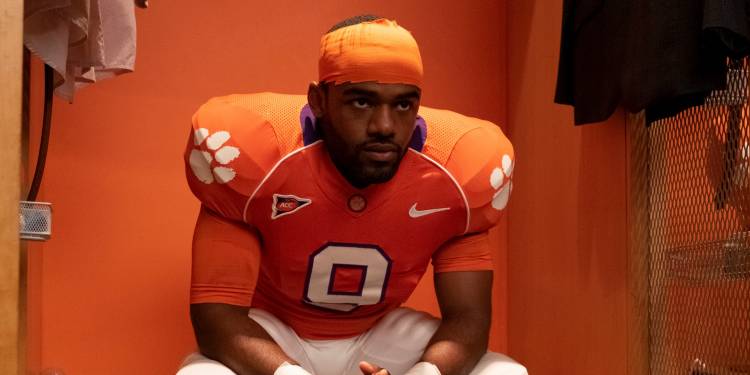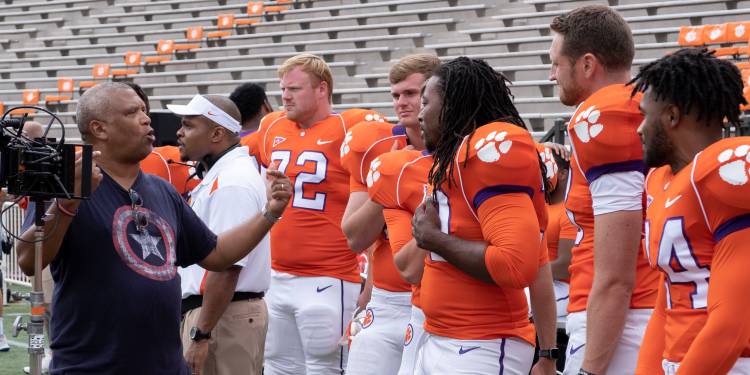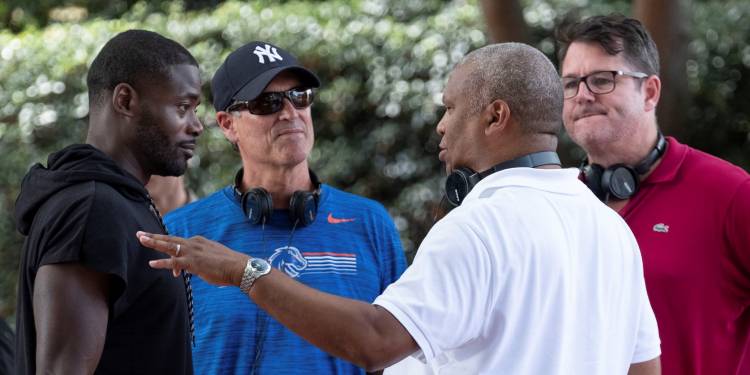Filmmaker Reginald Hudlin on ‘Safety,’ ‘House Party,’ and the Joy of Knowing Bernie Mac
Plus: How Disney+ gives room for more types of movies.

From director Reginald Hudlin and based on a true story, the inspirational drama Safety follows Ray McElrathbey (Jay Reeves), a Clemson University football safety who finds himself in the unexpected position of having to raise his 11-year-old brother Fahmarr (Thaddeus J. Mixson). Through dedication, determination and persistence, his unwillingness to give up on his dreams and his desire to keep his family together help him succeed both on and off the field.
During the virtual press junket for the Disney+ film, Collider got the opportunity to chat 1-on-1 with filmmaker Reginald Hudlin about why this story is what the country needs right now, working with the real Clemson University, shooting football in a different way, and what impressed him about his cast. He also talked about the lasting impact of his early films, House Party and Boomerang, his experience working with Bernie Mac on The Bernie Mac Show, taking on a very different Emmy Awards this year, and what he’d still like to do.

COLLIDER: This film is a showcase of strength, drive and courage, all in the name of family, and it’s a very inspirational story. When you first read this script and learned about this story, what aspect of it most inspired you?
REGINALD HUDLIN: All of it. What a perfect summary. You said strength, courage, drive and family. Man, how often do you get that, perfectly woven together in a single story? That’s everything I care about and what I believe in, and it’s a statement that needs to be made. This is, quite frankly, what the country needs right now, so I thought it was an imperative. I was just glad to get the opportunity to do it.
You’re not just telling a story about a real guy, but it’s also set at a real university, so what was it like to get them involved and to work with them throughout the project?
HUDLIN: Actually, all parties were great. Ray is a guy who has a reserve. His mind is always working. He’s very open and transparent about his life. That was very helpful for me in understanding him and telling his story. He was a touchstone for the cast and the crew because he was there on set. Clemson, once they saw what we were doing, was incredibly supportive. They let us shoot at half-time, during a game, for our stadium stuff, so there’s no CG. It’s all real. Two entities that could have been very challenging were, in fact, incredible partners.
How did you approach deciding how you wanted to shoot the game sequences? What was the thought process in deciding what to show, how much to show, and how you wanted to show it?
HUDLIN: Football is shot very well on television. We watch football on TV and we’re very engaged, so what are we gonna do in a movie that’s different or better than what you already see on Monday nights? It’s all about the subjective point of view. How can we get inside the head of the player and what they’re going through, whether it’s him when he doesn’t have his act together and he’s running down the field and he gets his bell wrong, or he does have his act together and, as the play’s about to start, he sees the opponent give his tell, he alerts everybody, and they make that move? That’s the part where you’re really advancing story and not just watching football plays, but the movie and the story is being moved by the plays.
Your leads are relatively new to audiences, so what impressed you about what Jay Reeves and Corinne Foxx brought to these roles?
HUDLIN: They’re good looking, charismatic people that you want to be around. That was so much of the fun of working with them. They’re smart, they’re funny, and they’re really dedicated to their craft. To be so young, they took these opportunities really seriously, and they’re fun. It was a really wonderful situation. I hadn’t worked with young actors like that since House Party. I’ve been fortunate to work with Eddie Murphy and Sam Jackson and Chadwick Boseman, so to work with folks at the beginning of their careers was really invigorating and fun.

Very early in your career, you did House Party and Boomerang, which were important moments in Black cinema, and they’ve also been lasting and enduring films. What did it mean to you to direct those movies, at that time, and how do you look back at them now?
HUDLIN: Well, I’m very grateful that they have stood the test of time and that a generation or more later people still go, “I love that movie! That’s my favorite movie!” People who weren’t born when those movies were out are fans. At the time, I was just really on fire because I really had something to say. They were both movies that didn’t exist in the marketplace and in the pantheon. I thought they should, and I was right.
You also directed 11 episodes of The Bernie Mac Show. What does that show’s legacy mean to you and what made Bernie Mac such a special performer, in your eyes?
HUDLIN: They joy was to spend all day and all week with Bernie Mac. He was brilliantly comic, but he wasn’t one of those comics that, off set, had this dark, twisted side. He was just a great guy. Once a week, he would cater a lunch in his dressing room, and it was not just a soul food spread. He’d have oxtail and lima beans. It was the next level of a soul food get down. You’d be eating and be like, “How am I going to work this afternoon? I’m gonna pass out.” And then, he’d be telling stories of his life, before he became a successful comedian, and they were the best stories you’d ever heard in your life. I remember the last time I saw him, we went to lunch together and he said to me, “You know, Reggie, you understand me about as good as anyone in this town.” And I just was so moved by that. He said, “You get me. Most people don’t get me, but you get me.” That really meant the world to me, and I really, really miss him.
How do you feel the Emmys went this year? What lessons did you learn for future producers of award shows in these times?
HUDLIN: I produce a lot of awards shows, and when I signed on to do the Emmys, all of my friends were like, “Hey, Reggie, congratulations! Are you crazy? This is gonna be a disaster. How are you gonna do an Emmys show?” But that was the point. I didn’t wanna do a traditional show. The only way to make it work was to blow it up. COVID was just an excuse to do what I wanna do, which is try to reinvent awards shows. It turns out, we pulled it off. I was really so overjoyed that it seemed to be universally acclaimed. People were like, “Wow, this is so much better. You’re not gonna go back, are you? You need to keep doing this kind of awards show.” That was the goal. We thought about, “What tropes of this kind of program are actually essential? What do we need to keep, and which ones can we throw away and maybe do something better?” It was an experiment that seemed to turn out great.
You seem like you’re pretty capable of doing it all, so what’s next for you? Do you know what you want to go into production on next? Is there something that you feel you still haven’t done?
HUDLIN: I learned a long time ago, if you wanna make God laugh, make plans. I can’t wait to play in the world of science fiction. I can’t wait to do a musical. I’ve done a lot of things in film and television, and there’s a lot of stuff that we’re working on. There are more documentaries that I wanna do. I don’t know. We’ll see what happens.
Does it feel like Disney+ is a home where you can make some of the types of movies that have fallen by the wayside a bit?
HUDLIN: Absolutely. I think what we’re really gonna see with streaming platforms like Disney+ is this kind of sports drama, which used to be a regular part of the theatrical marketplace. People love these movies, but they fell out of favor. Basically, theatrical was narrowed into superhero movies, horror films and musicals, and I love them completely, but gosh, is that it? As a filmmaker and as an audience member, to be able to make movies like Safety is fantastic.
